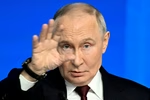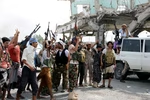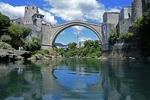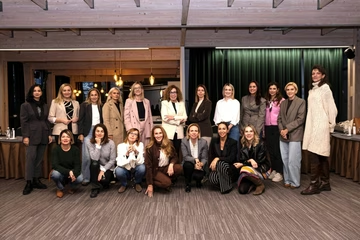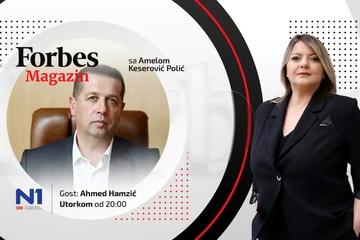Komsic, Dzaferovic on Victory Day: Ideas of BiH's division an example of fascism

Fascism is difficult to get rid of and comes in various forms and one of them is the recently published non-paper which proposes redrawing borders in the Western Balkans, the Bosniak and Croat members of BiH’s tripartite Presidency said on May 9, Victory Day.
Oglas
“My message to all of us in BiH is that we should turn towards building a complete and democratic state, a state of equal peoples and citizens, regardless of which part of BiH they live in,” said Bosniak Presidency member, Sefik Dzaferovic.
“We have witnessed in recent weeks in BiH retrograde, fascist ideas,” he said, referring to the controversial document which caused an uproar in Bosnia after it was published by Slovenian media.
The document, published by necenzurirano.si, proposes Kosovo joining Albania and Serbia annexing parts of Bosnia’s Serb-dominated Republika Srpska (RS) entity, while the mostly Croat-populated parts of southern Bosnia and Herzegovina would become part of Croatia.
According to the Slovenian news portal, the country’s PM, Janez Jansa, sent the document to Brussels. Jansa denied those claims.
“What else to call the intention to have BiH further territorially and ethnically divided,” Dzaferovic asked. "We all simply need to understand that the future is not in separation, division and discrimination, but that the future is in the unity of diversity when it comes to BiH and Europe.”
Bosnia has taken numerous steps to get closer to EU membership but “we have blockades within BiH, and they mostly come from those retrograde forces which I am referring to, those who want divisions, who do not fight discrimination, forces that don’t respect the rights of every person in every part of Bosnia and Herzegovina,” he said.
His Bosnian Croat colleague in the Presidency, Zeljko Komsic, noted that fascism is difficult to get rid of and that it can emerge in various forms.
“Sometimes it is extreme, clearly visible to the people, as it was in WWII and during the aggression on Bosnia and Herzegovina, but sometimes it’s packed into a political position, an idea,” he said.
“Today, the entire European continent is struggling with that same narrative. It’s something that every generation thinks was left behind and then every generation faces it again,” he said.
He said that fascism becomes evident when analysing “what certain parties are advocating for.”
“The problem of these political structures is that they go to the polls, win votes, control the state apparatus, control the public scene and then these ideas are legitimized,” he said, adding that the above-mentioned non-paper represents a “fascist narrative.”
The way to fight fascism is with democracy, rule of law, transparency and media freedom, he said.
Kakvo je tvoje mišljenje o ovome?
Učestvuj u diskusiji ili pročitaj komentare
Oglas
Kakvo je tvoje mišljenje o ovome?
Učestvuj u diskusiji ili pročitaj komentare
Oglas





 Srbija
Srbija
 Hrvatska
Hrvatska
 Slovenija
Slovenija

















